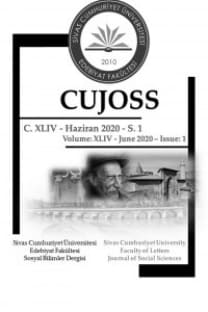Albert Camus’nün ‘Doğrular’ Adlı Oyununda Anlam Ve Değer Bakımından Kişi, Eylem Ve Özgürlük
Uyumsuzluk, özgürlük, başkaldırı ve dayanışma izleklerini tartışan Camus tiyatrosu eylem etiği için sağlam bir temel arayışındadır. Bunu yaparken, ‘yöntemsel kuşku’ ve ‘geçici ahlâk’ arasında gidip gelir. Uyumsuzluk yaşamla ilişkilidir, özgürlük insanın yazgısıdır, başkaldırı ise fizikötesi bir boyuta sahiptir ve öncelikle başkaldıranın kendi insanlık durumuna yöneliktir. Doğrular, yaşamı uyumsuz olarak görmenin ve bunun sonucunda her şeye rağmen mutlu olmak için eylemde bulunmanın oyunudur. Özgürlük için başkaldırı oyunun ana konusudur. Oyun, haksızlıktan hareketle kişinin ve yaşamın değerine vurgu yapar. Yaşamın anlamsızlığı, insanın mutsuzluğu, suç ve cezadaki görecelik gibi kavramları somut bir toplumsal olay olan devrim etrafında tartışan oyun, başkaldırma-devrim ilişkisini şiddet ve ölüm ekseninde açıklamaya çalışır. Bu çalışmada, Doğrular adlı oyunda kişi, eylem ve özgürlük anlam ve değer bakımından tartışılmaktadır.
Individual, Action and Freedom From The Mining and Value Point of View in The Play Titled ‘Justs’ of Albert Camus
Camus’ theater, which discusses the themes of absurdity, freedom, revolt and solidarity, is in search of a solid basis for morals without any religious beliefs. While doing this, it swings between ‘methodical doubt’ and ‘temporary morals’. Absurdity is in relation with the life, freedom is the destiny of human being, revolt has a metaphysical dimension and it is primarly towards the human condition of the rebel. Justs (Les Justes) is a play on a particular life perception, a definite activity limitation and a general problem of freedom and it refers to the concept of justice. Revolt for freedom is the essentiel theme. The play try to find a sense to the life and to the death. Camus discusses the human unhappiness which he regards as the greatest injustice. In this study, we are going to interpret the play Justs in the frame of the relation of politics-morals and revolt-revolution. As the revolt-revolution relation is discussed through referring to the use of violence, we are going to try explaining the relation between the problem of murder and general evil in human condition.
___
- BEAUMARCHAIS, J.-P. de. (1984), Dictionnaire des littératures de langue française, Paris:Bordas.
- BOUCHEZ, Madeleine. (1984), Les Justes,Camus, Paris:Hatier.
- BÜYÜKDÜVENCİ, Sabri. (1999) , “Ölümlerden ölüm beğen”, Düşünen Siyaset, Vol:4, mayıs, p.37-46.
- CAMUS, Albert. (1990) , Essais, Dijon:Gallimard ( Bibliothèque de la Pléiade)
- CAMUS, Albert. (1985), Théâtre Récits Nouvelles Bruges:Gallimard (Bibliothèque de la Pléiade)
- CAMUS Albert. (2003), Doğrular, İstanbul:Yaba Yayınları.
- CAMUS, Albert. (2003), Defterler 2, İstanbul: İthaki Yayınları.
- CAMUS, Albert. (2000), Başkaldıran İnsan, İstanbul: Can Yayınları.
- CAMUS, Albert. (1994), Denemeler, İstanbul: Say yayınları.
- DESHOULIERES, Christophe. (1989), Le théâtre au vingtième siècle, Paris: Bordas.
- FITCH, Brian. (1982), Albert Camus, Paris: Minard.
- GAILLARD, Paul. (1973), Présence littéraire Camus, Paris: Bordas.
- GRENIER, Roger. (1991), Albert Camus, Paris: Gallimard.
- İNAM, Ahmet. (1999), “Olabileceğini olmada ölümün yeri”, Düşünen Siyaset, Vol:4, Mayıs, .p.17-23
- LAKOFF, George- JOHNSON, Mark. (2005), Metaforlar, Çeviren: Gökhan Yavuz Demir, İstanbul: Paradigma Yayınları.
- LEBESQUE, Morvan. (1984), Camus, İstanbul: Alan Yayıncılık.
- LICHET, Raymond,(1983), Lire Camus, Paris: Hachette.
- LOTTMAN, Herbert R.. (1984), Albert Camus, Paris: Seuil.
- Magazine littéraire, Numéro Albert Camus, No:276, Avril 1990,
- MAILLARD, Michel. (1996), Camus, Paris. Nathan.
- MOUNIER, Emmanuel. (1970), Malraux Camus Sartre Bernanos, Paris: Seuil.
- O’BRIEN, Conor Cruise. (1994), Camus, İstanbul: Afa Yayıncılık.
- SARTRE, Jean-Paul. (1984), Situations I , Mayenne: Gallimard.
- SIMON, Pierre-Henri. (1951), Témoins de l’homme, (Albert Camus et l’homme), Paris:Armand Colin.
- ŞENER, Sevda. (1998) Dünden Bugüne Tiyatro Düşüncesi, Ankara: Dost Kitabevi.
- VAN-HUY, Pierre. (1968), La Métaphysique du bonheur chez Albert Camus, Neuchâtel: de la Bacônnière.
- ISSN: 1305-5143
- Yayın Aralığı: Yılda 2 Sayı
- Yayıncı: Sivas Cumhuriyet Üniversitesi Edebiyat Fakültesi
Sayıdaki Diğer Makaleler
Saint-Exupery’nin Küçük Prens Anlatsında Dostluk Arayışı
On Fichte’s Reconstruction of The Kantian Unity of The I
Albert Camus’nün ‘Doğrular’ Adlı Oyununda Anlam Ve Değer Bakımından Kişi, Eylem Ve Özgürlük
Toplumsal Yapı Ve Değişme Kuramlarını Paradigma Temelli Bir Sınıflandırma Denemesi
Son Dönemlerde Yaşanan Krizlerin İşletmeler Üzerindeki Olumlu Etkilerinin Analizi
Muzaffer AYDEMİR, M. Kemal DEMİRCİ
Yaşlılık Olgusu: Sivas Huzurevi Örneği
Alman Kültürü ve Edebiyatında Uğursuz Deniz Kızı Olarak Mitleştirilen Kadın
